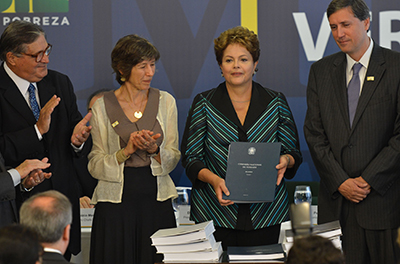A historic step

 Nearly 30 years after the end of the military dictatorship (1964-1985), the members of the NTC (National Truth Commission) this Wednesday, December 11, presented the most important document ever produced in Brazil on the human rights abuses that occurred in the country between 1946 and 1988. The three-volume report was received by President Dilma Rousseff in an official ceremony at the Planalto Palace (the presidential residence).
Nearly 30 years after the end of the military dictatorship (1964-1985), the members of the NTC (National Truth Commission) this Wednesday, December 11, presented the most important document ever produced in Brazil on the human rights abuses that occurred in the country between 1946 and 1988. The three-volume report was received by President Dilma Rousseff in an official ceremony at the Planalto Palace (the presidential residence).
The full version of the report can be downloaded here.
The report confirms the “widespread and systematic” nature of the gross human rights violations committed during the dictatorship by agents of the Brazilian State and concludes that the situation investigated by the members of the commission “persists to the present day”.
“Although it no longer occurs in a context of political repression – like it did during the military dictatorship – the practice of illegal and arbitrary detentions, torture, executions, forced disappearances and even the concealing of bodies is not foreign to contemporary Brazil,” says the report in its conclusions.
“Despite all the barriers imposed on the NTC, starting with the lack of cooperation by the Armed Forced, we cannot diminish the historical, political and symbolic value of this report, particularly since it sheds light on the challenges that our democracy inherited from the dictatorship – namely, the persistence of torture and police violence,” said Rafael Custódio, coordinator of the Justice program at Conectas.
 According to Flávia Piovesan, a professor of constitutional law at the Catholic University of São Paulo (PUC/SP), “the report recognizes the organized and systematic violence of the state apparatus”. Piovesan also stated that “we are experiencing the end of this process, but also the start of another – which implies the promotion of profound institutional changes in the democratic rule of law, from the promotion of historical consciousness to legislative reforms”.
According to Flávia Piovesan, a professor of constitutional law at the Catholic University of São Paulo (PUC/SP), “the report recognizes the organized and systematic violence of the state apparatus”. Piovesan also stated that “we are experiencing the end of this process, but also the start of another – which implies the promotion of profound institutional changes in the democratic rule of law, from the promotion of historical consciousness to legislative reforms”.
At the top of the NTC’s recommendations is the request for criminal, civil and administrative accountability for public officials involved in human rights abuses. This, explains Piovesan, demonstrates that the Commission accepts the thesis that crimes against humanity are imprescriptible. According to the Commission, therefore, the investigation and prosecution of public officials does not require a revision of the Amnesty Law by the Supreme Court. “The position of the members of the NTC paves the way for bolder positions by government institutions on this matter,” she said.
Institutional changes
Overall, the 29 recommendations made by the NTC to the Legislative, Executive and Judiciary in the report are an attempt to pave the way for institutional changes that can strengthen respect for human rights. Among them are the suggestions made by Conectas to the Commission through the open mechanism for citizen participation during the preparation of the report.
This is the case of the recommendations to create state-level mechanisms to prevent and combat torture similar to the National Mechanism signed into law by the Presidency in August 2013, and to pass the bill (554/2011) that establishes detention hearings – which would guarantee that suspected offenders are seen by a judge shortly after their arrest, preventing torture and reducing unnecessary imprisonment.
The other recommendations made by Conectas and accepted by the NTC focus on strengthening Community Councils and establishing them in the judicial districts where they do not already exist; banning abusive searches in prisons; assuring the independence of forensic agencies from state public security departments; creating external and independent ombuds offices and internal affairs units for the prison system; and, finally, reforming the police.
Click here to read the full text of the recommendations submitted by Conectas to the NTC.
Background
The Amnesty Law (6683/79) was considered constitutional by the Supreme Court in May 2010. In November of the same year, the Inter-American Court of Human Rights (in the case of Gomes Lund et al.) declared the Amnesty Law to be incompatible with the American Convention on Human Rights. The judgment concluded that the provisions of the Amnesty Law constituted obstacles to the investigation and punishment of serious human rights violations and crimes against humanity and prevented the victims of persecution from receiving reparations.
In an October 2014 resolution on compliance with the judgment, the Inter-American Court reaffirmed the “incompatibility” of the Amnesty Law with the international commitments made by Brazil on the subject of human rights. The Court reiterated that the interpretation of the law “continues to compromise the international responsibility of the State and perpetuates the impunity for gross human rights violations, in blatant disregard of the judgment of this Court and of International Human Rights Law”.
The report of the NTC, therefore, can be seen as an important step for Brazil to finally comply with its international obligations on this matter.
Click here to read the judgment of the Inter-American Court in the case of Gomes Lund (2010) and here to see the resolution (2014) by the same Court on Brazil’s failure to comply with the decision


